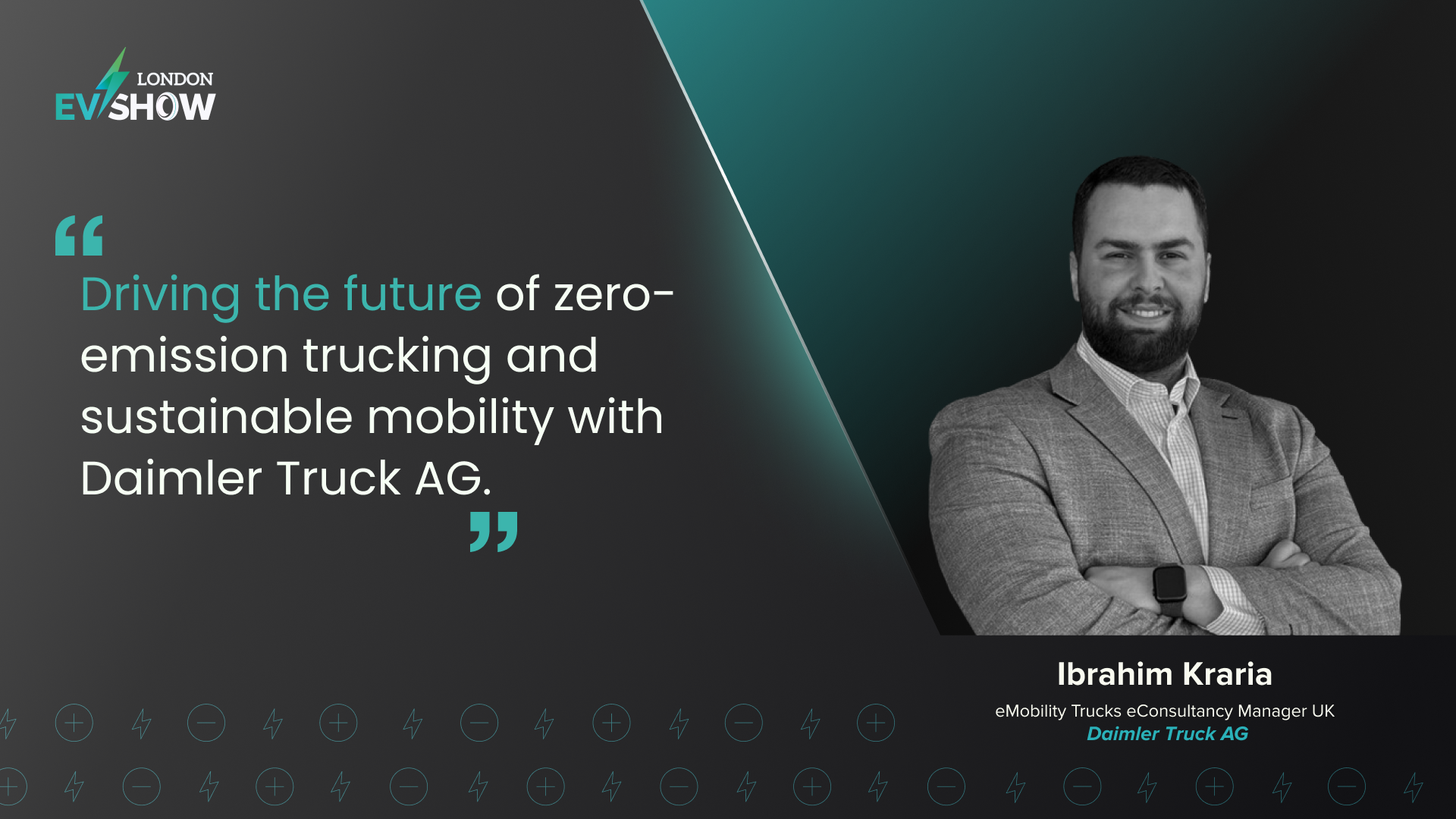Ibrahim Kraria, eMobility Trucks eConsultancy Manager UK at Daimler Truck AG, joined the London EV Show team for an engaging discussion on the future of electric trucks and Daimler Truck AG’s battery-electric and hydrogen-powered strategy. He highlighted how models like Mercedes-Benz eActros, Freightliner eCascadia, and FUSO eCanter are leading the shift to zero-emission transport.
He also addressed charging infrastructure challenges, explaining Daimler’s eConsultants, TruckCharge, and Milence joint venture initiatives. Lastly, Ibrahim emphasized the London EV Show’s role in educating industry players, tackling misconceptions, and driving policy support for zero-emission commercial transport.
#LEVS: How do you see the evolution of electric trucks contributing to a greener future for the commercial vehicle industry?
#Ibrahim: Daimler Truck is pursuing a two-pronged strategy of investing in both battery-electric and hydrogen powered drivetrains, but electric trucks are the solution that’s already available today. Our EVs offer proven efficiency and can help operators make a very important first step towards a greener future.
#LEVS: How is the electrification of Daimler Truck AG’s key brands—such as Mercedes-Benz eActros, Freightliner eCascadia, FUSO eCanter, and others—contributing to sustainability, and what unique features across these electric models are helping to drive the shift towards zero-emission transportation?
#Ibrahim: Daimler Truck is the world’s biggest manufacturer in terms of volume and as such we have a key role to play in making transport more sustainable. That’s why we’ve developed technologies that are transferable across our brands, such as our eAxle, and cellcentric, our fuel cell partnership with Volvo Group. Our eActros 600 model combines a 600 kWh battery and super-efficient eAxle drive to allow a range of at least 500 km on a single charge – its abilities were demonstrated superbly when it easily completed the EV Rally around Britain this year, travelling a total of 1,400 miles, fully loaded at 40t GCW, across five days. At the other end of the scale our FUSO eCanter models offer highly practical solutions for the lighter weights and shorter distances – up to 200km - typically involved in urban distribution.
#LEVS: As Daimler Truck AG continues to electrify its global fleet across brands like Mercedes-Benz, Freightliner, and FUSO, how is the company addressing the challenges of charging infrastructure and range anxiety to ensure widespread adoption of electric trucks for long-distance and heavy-duty applications?
#Ibrahim: We’ve set up teams of eConsultants, both on a national level and across our Dealer Network, whose role is to support operators making the switch to electric transport. They can advise and help with everything from charging infrastructure, to efficient route planning, to making full use of any available subsidies. We recently launched our own charging point Brand, TruckCharge, to give operators a one-stop shop for all their needs. Meanwhile Milence, our joint venture with Traton and Volvo Group, is committed to building Europe’s leading charging network for heavy-duty transport. Milence opened it’s first hub in Immingham this month.
#LEVS: How is Daimler Truck AG working to improve the total cost of ownership for electric trucks, making them more appealing to businesses in the long term?
#Ibrahim: Operating efficiency is key and our eAxle drive system fitted to eActros 600 with four-speed transmission makes for lower costs per kilometre – we can offer this benefit because the eActros is not a conversion of a diesel truck, it was designed from the ground up for battery power. Our eConsultants work tirelessly to support operators to run their EVs in the most cost-effective way while packages including Uptime, service complete and our range of Digital Services all combine to help customers maximise efficiency. Many businesses in the UK and across the world have understood and justified this move to electric trucks and have ordered the eActros 600, with Amazon ordering over 200 across Germany and the UK.
#LEVS: How do you believe events like the London EV Show contribute to advancing the adoption and innovation of electric heavy commercial vehicles, and what value do they bring to the industry?
#Ibrahim: Events like this are vital to keep operators fully informed of latest developments and maintain the profile of the efforts being made across industry to drive forwards towards zero-emissions transport, and to keep up pressure on policy makers to do all they can to support. There are still misconceptions in the industry about battery-powered vehicles being difficult or even impossible to operate in the real world, but electric transport is here now and we have both the products and the support services to make it a viable choice.


